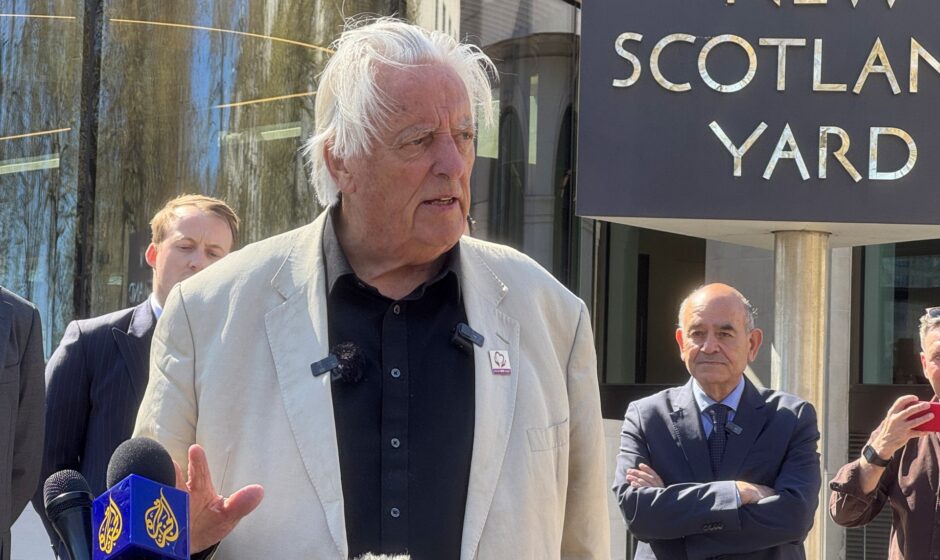London, United Kingdom – Ten British citizens, including dual nationals, who have served in the Israeli army are being accused of war crimes in Gaza.
They are suspected of acts such as “murder, extermination, attacking civilians, and deportation or forcible transfer of population”, according to the Palestine-based Palestinian Centre for Human Rights and the UK-based Public Interest Law Centre, which last week submitted a 240-page report to the Metropolitan Police’s War Crimes Unit.
Michael Mansfield, 83, a leading English barrister who has worked on several high-profile cases throughout his career and is dubbed “the king” of human rights work, was among those who handed over the dossier that took a team of lawyers and researchers in Britain and The Hague six months to compile.
Dozens of other barristers, lawyers, researchers and human rights practitioners have signed a letter of support, urging the Met’s war crimes team to investigate the complaints.
Due to legal reasons, neither the names of the suspects, some of whom worked at the officer level, nor the report in full are being made public. Alleged war crimes from October 7, 2023, to May 31 are documented in the file, which is based on open-source material and witness testimonies.
Al Jazeera interviewed Mansfield about the landmark case, his views on Israel’s genocide against Palestinians in Gaza and why he believes legal efforts against those involved in the onslaught remain important, even as critical rulings are ignored by those in power and mass killings continue unabated.
Al Jazeera: What can you tell us about the case?
Michael Mansfield: The reason I can’t talk about the detail of it is perhaps obvious: … The people [accused] would immediately know who they were.
If a UK national commits any serious crime abroad, … you are liable to be and are investigated, arrested, charged and tried here in the United Kingdom. This is nothing out of the ordinary in that sense.
The out-of-the-ordinary bit, of course, is that it is linked to war crimes and crimes against humanity, which are international crimes.
The United Kingdom can obviously investigate themselves, or the International Criminal Court can investigate and charge and so forth.
Nobody can be unaware of the extent of the devastation, particularly in Gaza, although that’s not the only place in the world where such things are happening. And in relation to those matters, the public are asking, “What are we doing about it? What can we do about it?”
The international institutions of justice and conventions on human rights were established just after the Second World War in order to prevent this happening, if at all possible, by intervening.
[But] the United Nations’s ability to intervene has been emasculated by the major nations – Russia and America nearly always opposing each other. On top of that, the United Kingdom sitting on the fence and abstaining on most of these issues.
Slowly but surely, all the principles to do with the rule of law and rules-based democracy have been, essentially, denuded from practicality.
The court finds it very difficult to do anything because the countries [allegedly behind war crimes] are seemingly immune. They don’t mind what the international courts may think – either the International Criminal Court [or the] International Court of Justice.
Al Jazeera: As most monitors and observers are unable to enter Gaza presently due to the Israeli siege, how did the researchers and lawyers behind the report identify those accused?
Mansfield: Linking the individual [to the alleged crimes] is the problem. You’ve got to be able to provide investigators with at least enough evidence for them to say this is worth investigating.
They might say, “We can’t do this. It’s too difficult.” Then they might hand it over to the International Criminal Court, which has more resources.
There’s something called the Berkeley Protocol, which is focused on how you would gather evidence from publicly available sources.
Publicly available sources could be Al Jazeera [footage]. It could be somebody doing a selfie on their own phone.
The research has already been done to ensure that the material on these 10 is sufficient for the police to take a decision whether they can do more or not.
Al Jazeera: This month, Hungary withdrew from the International Criminal Court, which has issued an arrest warrant for Benjamin Netanyahu, ahead of a visit by the Israeli premier. If the global institutions that are meant to uphold human rights laws are under threat, decisions are sidestepped, and massacres continue in places like Gaza. What impact can legal efforts like yours have?
Mansfield: I think they do make a difference for those of us who care.
I mean, they don’t make a difference to the perpetrators. They never have. And that’s why they had the Nuremberg trials at the end of the Second World War.
As a lawyer, I can’t just sit back and say I’ve wasted 55 years of my career. I’ve got to be able to say I have strived hard to get a situation in which people are made accountable.
The law has been unable to deliver. The law is there, the institutions are there, but until governments … start paying respect to the rule of law and not ignoring it, there are lots of different ways in which people can be made accountable. As lawyers and as thinking members of the public, we have to be at the ready to get the authorities to actually do their job because if we don’t, no one else will, and it’ll just get worse.
The basic freedoms you and I enjoy when we can – freedom of association, movement, speech and so on – they’re not divisible. What I mean by that is you might live on the other side of the world, but if it’s your rights being attacked in this way, it’s me as well. Make no mistake, when it’s happening there, it could be you next.
That sort of approach to human rights is not a sort of woke topic that just a few liberal lawyers think of. It’s been fought hard for by other people. Lawyers in the past have fought very hard to set it all up.
Al Jazeera: Do you classify what’s happening in Gaza as a genocide?
I do, yes, no question.
In this particular instance, if you’re attacked personally in the domestic sense or in any other, you’re entitled to defend yourself but only up to a point.
If you’re attacked with somebody holding a wooden spoon, you can’t use a machinegun to kill them. … This has gone far beyond self-defence.
Of course, they [aggressors, in this case Israel] will always justify it and say that it’s self-defence, but you only have to see what they’ve done.
A lot of the victims are women and babies and children and doctors and journalists. … They are protected individuals under the law.
In my view, it’s clearly a genocide because they’ve [Israeli officials] made it very clear in various statements. They’re talking about a bigger Israel. There’s a political ambition that lies behind the whole thing, not for all, you know, members of the [Israeli military] and so on, but I think a sizeable proportion.
[They] obviously are adhering to that principle that they want to see Gaza wiped off the map, and yes, they would like it reinstated as a Riviera resort of the Trump empire.
It’s gone beyond plausible.
[Note: The International Court of Justice said in January 2024 that it was plausible that Israel was committing genocide in Gaza.]
Al Jazeera: How will the world look back on this moment in history?
Mansfield: I hope it will bring about change of some kind in people’s hearts and minds.
The leaders of the world have the right to do something about it, and I think that our own prime minister [UK Premier Keir Starmer] should do more than he’s doing.
Originally, we [the UK] objected to the issue of arrest warrants. However, that was the previous [Conservative] government and when [Labour’s] Starmer was elected, he changed that. He withdrew his objections on behalf of the United Kingdom, so that was one step in the right direction.
I think we’ll look back and say, actually, thousands turn out for marches. Thousands of people are globally angry, upset and feeling hopeless, which is why keeping the law alive in the way the chief prosecutors tried to do, not just for Israel, but for other perpetrators as well, including [Russian President Vladimir] Putin and Russia and Ukraine.
We’ve got to keep the caring alive. You can’t get away from it. You can’t hide in your bedroom and think, “Oh, I didn’t start this.” No, you didn’t, but if you’re a member of the human race, I’m afraid you have a responsibility.
If I don’t spend every waking hour trying hard to keep what others set up in the first place [the rule of law], I feel I will have failed.
You can’t just back away from it and hope that it’ll blow away because, well, that’s what the politicians hope, that we’ll all give up. I think it’s [about] creating a well of public opinion, so that the politicians realise there’s nowhere to go because actually they’re not supported.
You’ve got to connect, engage and then do as much as you can. That’s all that can be expected. Once you do that, you’ll find hundreds and thousands of others doing the same, and then eventually politicians go, “Oh, right, there are votes here. We better do the right thing.”
It’s moving opinion all the time and keeping the flame alive.
Al Jazeera: How would you summarise the ongoing atrocities?
Mansfield: I would describe it as a mass assault and destruction of humanity. It doesn’t get worse than that.
Al Jazeera: You’ve worked on high-profile cases, such as representing the family of Stephen Lawrence, the Black British teenager stabbed to death in a racist attack, and the Birmingham Six, the group of Irishmen wrongfully arrested for bombings in 1974. What binds the work you’ve done together?
Mansfield: It’s the effect and impact on a community. Now the Lawrence case, as it turned out and as it was at the time, had a huge impact on a community. It represented a much bigger issue than, you know, the stabbing of Stephen Lawrence, which was horrific.
Although it wasn’t on your TV screens like Gaza and you didn’t see destruction of the kind you see in Gaza, it had a similar effect on people.
And there have been other cases like that. It’s not about whether it’s just one individual or thousands. It’s about the impact on the principle of fairness.
Note: This interview was edited for clarity and brevity.
#Top #barrister #Israel #carrying #destruction #humanity #Gaza #IsraelPalestine #conflict #News


